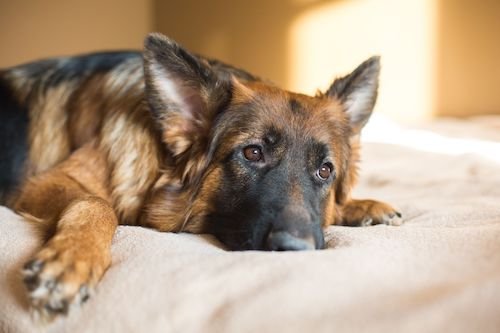When Dogs Die, Do Other Dogs Know?
Average Reading Time: 2 minutes, 1 second
©Scott Sheaffer, CBCC-KA, CDBC, CPDT-KA, USA Dog Behavior, LLC
“After his death, I had two questions.”
In the fall of 2014, I had my once-in-a-lifetime dog euthanized for health reasons. He had become so debilitated and sick that the vet was adamant it was time. To say I was heartbroken is the understatement of understatements. I am still sad and find myself reflecting and crying at times about the loss of this absolutely magnificent animal.
His name was Fred. He was a beautiful German Shepherd. Godspeed Fred.
After his death, I had two questions. Will I see him again? That’s a very interesting question I will address in a future article. The other question I had was, how will Fred’s death affect my other living dog? My other dog was a sweet-as-can-be Cavalier King Charles Spaniel named Reagan. They enjoyed each other’s company.
I knew from experience with my own dogs and clients’ dogs that it was going to be one of three common reactions:
Depression. Yes, most dog behaviorists believe, as do I, that dogs can get depressed in the same ways humans do. Symptoms of canine depression can include loss of interest in things they normally enjoy, change in eating and sleeping habits, inactivity and acting withdrawn.
There are two primary motivations for surviving dogs to become depressed. One is the loss of their buddy. The other is their response to the owner’s sadness over the loss. Dogs can feel and mirror our moods - both happy and sad.No Change. In my experience, the majority of surviving dogs in the household have no significantly noticeable change. I hope that doesn’t make you sad or even angry at dogs who respond in this manner. Remember most dogs prefer the company of their human owners, not the other dogs in the household. Further, they don’t have the cognitive ability to process all the human cultural nuances associated with death.
Energized. This one may surprise you. If a surviving family dog was being controlled and dominated by the dog who died, sometimes the surviving dog will rather suddenly become much less inhibited.
How did Reagan respond to the loss of Fred? He was a “no change” dog. At first it was hard for me accept his uncaring attitude about Fred’s absence while I was dying from grief. I had to remember what I mentioned above. Reagan’s focus was on me and I was still there for him. I was reminded that it’s important to be available to your surviving dogs when you lose one of the dog members of your family.
Dog behaviorists can only speculate on why dogs’ behaviors can vary so much from dog to dog when a dog dies who lived in their home with them. We can only make educated guesses because we can’t talk with them to learn more. Just know that any of the three responses noted above is normal; it’s important we don’t judge the surviving dog.
Read More
You’ve Decided to Euthanize Your Dog, Now What?
Have you owned your once-in-a-lifetime dog yet?

